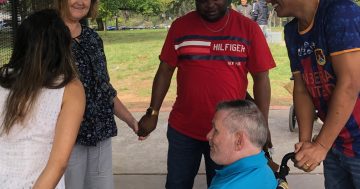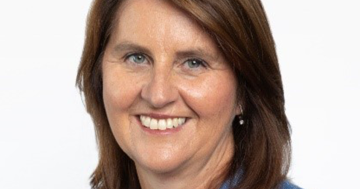The disability support system in both the ACT and Australia wide has long been in need of an overhaul. People with disabilities are often unable to participate in all aspects of life like people without disabilities, because there is not enough care and support available to them.
Nearly 100,000 Australians have already put their hope for change behind the National Disability Insurance Scheme (NDIS) through the Every Australian Counts campaign. The NDIS, proposed by the Disability Care and Support Productivity Commission (February, 2011) recommends improving the way in which disability services are funded and delivered, by providing more person-centred and individualised services.
This change to the disability support system is especially vital for women with disabilities who face discrimination not only based on their disability, but based on their gender. In the ACT, 18% of women have a disability, of which 5% have a disability that severely limits their core activities (ABS, 2009). Because of their gender, these women have different experiences and therefore needs from services and supports.
For example, women with disabilities are more likely to feel unsafe due to an increased risk of sexual assault and violence. One woman who told her story for the Every Australian Counts campaign, Claire, reports that because the current system lacks resources and person-centeredness, she was placed in a vulnerable position when she could not open the door to her home due to loss of mobility. Claire says:
“I had to get in through the side gate… But I couldn’t put a padlock on it. I applied for some funding for alterations to my front door so I could come in and out. It took 12 months from the first phone call to the new door being fitted. While I didn’t have a lock on my back gate, I was vulnerable, and I had someone break into my house while I was home. It was very scary – being a single woman on my own and hearing someone coming into my home in my back window. It took me quite a while to sleep again after that (Every Australian Counts, 2011).”
Other gendered issues that women with disabilities experience include:
- Reproductive and sexual health needs
- Status as primary providers and carers of children
- Increased risk of experiencing poverty and violence
- Housing difficulties due to low income, special needs and discrimination
- Underrepresentation in the workforce and higher unemployment
Women – with disability or without disability – are more vulnerable than men to experiencing all of these issues. In almost every society, women’s status remains lower than men’s. This is reflected in the high incidence of violence against women; women’s lower socio-economic status; an under-representation of women in positions of power; and an over-representation of women in part-time and casual work, amongst other things. However, in every category women with disabilities are further disadvantaged, and despite this, services are less accessible for women with disabilities
The proposed NDIS offers hope that support systems for people with disabilities can be more gender sensitive, by allowing greater consumer control over supports, therefore taking into account gendered life circumstances. For women with disabilities, this means that gender-stereotyping and lower social status are taken into account when considering their support needs. For example, in the current system services are delivered by organisations funded for disability support whereas under the proposed NDIS, women will able to ‘purchase’ supports from a wider number of services to more holistically meet their needs.
In August this year the Federal Government announced their support for the NDIS and are currently deciding what shape the reforms will take. It is essential that they respect and fulfil the Productivity Commission’s call to change the system which is “inequitable, underfunded, fragmented and inefficient and give people with disability little choice” (February, 2011).
Disability is likely to touch the lives of many people in the ACT, through personal experience or through the experience of family and friends. The Canberra community must support the NDIS, and the ACT Government must continue to back the scheme and cooperate with the National rollout. The NDIS is one step closer to meeting the gendered needs of women with disabilities, and achieving equal participation in the ACT community.
The Women’s Centre for Health Matters is supporting the Every Australian Counts ‘Spread the Word Week’ from November 27 – December 3.
For more information see the Every Australian Counts campaign, the National Disability Insurance Scheme and the Women’s Centre for Health Matters.



















